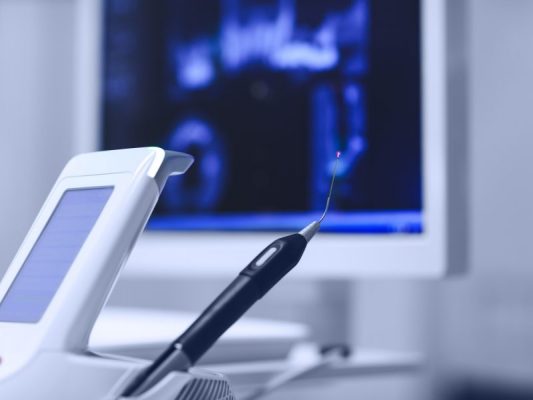In recent years, laser dentistry has become increasingly popular due to its ability to improve surgical procedures. Lasers can disinfect the dental implant site, reducing the risk of infection. The intense heat generated by lasers can help kill bacteria and other microorganisms. In turn, it can help promote faster healing and reduce the risk of infection after the procedure.
Additionally, lasers can minimize discomfort during the procedure. Laser use can reduce the need for sutures, bleeding, and swelling, making the procedures more comfortable for patients and shortening their recovery time.
Lasers allow for better visualization of the surgical site, enhancing precision and accuracy during the procedure. This often leads to better cosmetic outcomes for the patient and more successful implant placement.

Types of Lasers
There are several laser types used for dental implant surgery. The most commonly used laser is the erbium laser. The erbium laser is effective at cutting hard tissues like bone and can be used to precisely shape the implant site. Another commonly used laser is the diode laser, which is used to treat soft tissues such as gums.
The type of laser used is dependent on your dentist. If they use lasers for the dental implant procedure, you’ll be informed at your initial consultation.
Benefits of Laser Dentistry
Using lasers during the dental implant procedure may provide patients with the following benefits:
- More precise and controlled incisions in the gums and bone
- Quicker recovery time
- Ability to disinfect the implant site and promote faster healing
- Reduced risk of infection
- Minimized discomfort during the procedure
- Reduced surgical time
- Reduced need for sutures
- Reduced bleeding and swelling
- Reduced risk of thermal damage to surrounding tissue
- Better visualization of the surgical site
- Enhanced precision and accuracy
- Reduced post-operative pain and discomfort
- Reduced healing time
- Enhanced cosmetic outcomes
Laser Dentistry Risks
Laser dentistry is often considered a safer alternative to traditional dental tools and techniques. They don’t require sterilization after each use, and lasers can be used with a high degree of precision. Despite the safety and effectiveness of laser dentistry, it may not be suitable for every patient, and there may be some associated risks.
It’s important to discuss your specific case with a dental professional to determine if laser treatment is an appropriate option for you. Your dentist can provide more information and answer any questions you may have during an initial consultation.
Laser Dentistry Costs
The cost of laser implant surgery can vary depending on several factors, including the number of implants being placed and the specific type of laser used. In general, laser implant surgery is more expensive than traditional implant surgery. The cost can also depend on where your dentist is located and the cost of living in that area. Some dental insurance plans cover laser implant surgery, but coverage will vary depending on the specific plan and the type of treatment.
Please note that cost shouldn’t be the only consideration when choosing treatment. While traditional implant surgery may be less expensive, the benefits of laser implant surgery, such as reduced recovery time and improved cosmetic outcomes, may be worth the additional cost for some patients. It’s always best to discuss the cost and any other concerns you may have with your dentist before making your decision.
Also, keep in mind that some dental clinics may offer financing options for patients who need to pay for their treatment over time. Additionally, some may offer discounts or special offers for patients who pay for their treatment in full or in cash.
Frequently Asked Questions
Patients should inform their dentist of any medications they’re taking or any medical conditions they have before undergoing laser dentistry procedures. They should also avoid any blood-thinning medications for some time before the procedure.
Laser dentistry uses a high-intensity light beam to perform various dental procedures concerning dental implants. They can be used to prepare the gums and surrounding tissue for implant placement and to perform necessary adjustments during the healing process.
Laser dentistry allows for precise, controlled tissue removal and contouring, reducing the risk of postoperative complications and ensuring optimal implant placement. Lasers also promote faster healing, reducing the overall treatment time for a more positive outcome.
Improve Your Dental Implant Surgery & Recovery With Laser Dentistry
Advanced technology like laser dentistry easily improves the entire dental implant process. With quicker recovery times and less-invasive procedures, laser dentistry will improve your dental implant experience and allow you to achieve a complete smile in no time. You can learn more about advanced technology and dental implants by contacting our Farmington, NM, dentists today.
